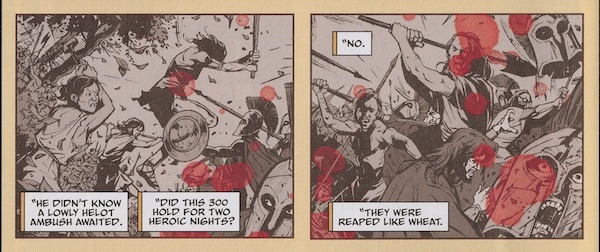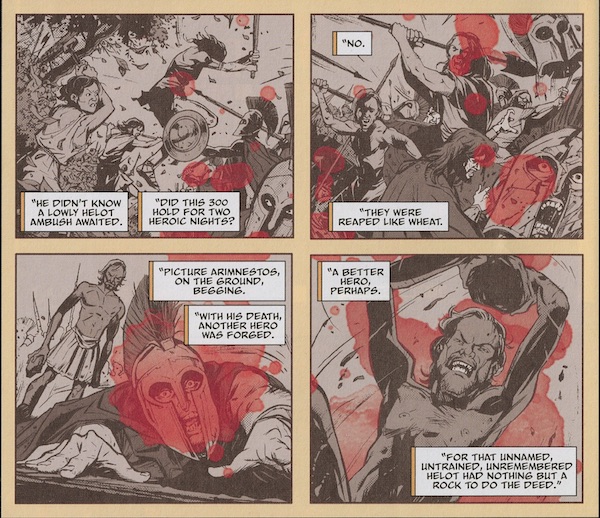
July 16, 2020, by Lynn Fotheringham
Stenyklaros
(Διαβάστε στα ελληνικά.) (Revised 24/08/20.)
CONTENT: ANCIENT GREEK SLAVERY, MILITARY ACTION, VIOLENCE, DEATH, IMAGES OF VIOLENCE
Three, by Kieron Gillen and Ryan Kelly; chapter/issue 1, cont. [For an introduction to Three, see this post.]
In the previous post, I looked at Terpander’s apparent praise of an earlier Arimnestos who killed the Persian generalissimo, Mardonios. The Arimnestos in the comic seemed to enjoy this story. But Terpander keeps talking…
You have to turn the page to find out what happens next, and that small action is perfectly timed, because the mood shifts dramatically on the page-turn.

THREE, ch.1, p.22 panels 1-2
This is the first time the comic refers directly to Sparta’s current political situation within Greece. Sparta in 364 B.C.E. is very different from the one that triumphed (along with other Greeks) over the Persians at Plataea.
Events in the period immediately preceding Three will be covered in more detail in chapter/issue 2. The point that Sparta’s power is not what it used to be is efficiently conveyed to the reader here when Terpander mentions Sparta’s loss of the territory of Messenia to the west. Sparta had probably conquered Messenia in the eight century B.C.E., and dominated it ever since, converting almost all its inhabitants into Helots (a status akin to slavery).
The event referred to by Terpander took place decades before (‘when it was yours’). What he has said so far is already going to annoy Arimnestos and the other Spartiates. But Terpander goes on to rub salt in the wound:

THREE, ch.1, p.22 panels 3-6
This incident comes from Herodotus 9.64.2:
ἀποθνήσκει δὲ Μαρδόνιος ὑπὸ Ἀειμνήστου ἀνδρὸς ἐν Σπάρτῃ λογίμου, ὃς χρόνῳ ὕστερον μετὰ τὰ Μηδικὰ ἔχων ἄνδρας τριηκοσίους συνέβαλε ἐν Στενυκλήρῳ πολέμου ἐόντος Μεσσηνίοισι πᾶσι, καὶ αὐτός τε ἀπέθανε καὶ οἱ τριηκόσιοι. |
And Mardonios was killed by Aeimnestos, a man notable at Sparta, who a long time after the Persian wars, leading three hundred men, engaged [in battle] at Stenyklaros, it being war[-time], with all the Messenians, and both he and the three hundred died. |
- Text by A.D. Godley, Loeb Classical Library vol. 120, 1925; literal translation by Lynn Fotheringham; Godley’s translation in previous post.
Herodotus doesn’t date this encounter; it’s possible it took place during the Helot revolt following a massive earthquake in 464 B.C.E., which was substantial enough to justify the word ‘war’. If Arimnestos was a young man in his twenties in at Plataea 479, he could easily still have been campaigning in the late 460s. But there could have been other periods of ‘war’ we don’t know about.
I said before that the number 300 comes up again and again in Spartan history. Arimnestos wasn’t a king so these 300 were presumably not the royal bodyguard.
Kieron’s note draws attention to the fact that stories are affected by the storytellers’ point-of-view:

THREE, historical footnote
Herodotus’ language does suggest a battle and a substantial number of opponents. The Spartans may have thought the Messenians were likely to be a disorganised rabble against whom 300 would be sufficient; if so, they seem to have misjudged: all 300 died, reminding Terpander of Thermopylae. This is impressive enough in a battle, but Terpander’s account, which makes the Messenians look very disorganised and unmilitary, is more impressive still.
Note that Herodotus doesn’t say anything about a rock. That detail – as you may remember from the previous post – actually comes from Plutarch’s account of Plataea (Aristides 19.1):
καὶ τὸν Μαρδόνιον ἀνὴρ Σπαρτιάτης ὄνομα Ἀρίμνηστος ἀποκτίννυσι, λίθῳ τὴν κεφαλὴν πατάξας, … |
Mardonius was slain by a man of Sparta named Arimnestus, who crushed his head with a stone, … |
- Text and translation by Bernadotte Perrin, Loeb Classical Library vol.47, 1914.
Kieron acknowledges this:

THREE, historical footnote
It suits Terpander’s heroising of the ‘lowly Helot ambush’ here to emphasise that they achieved what they achieved without even standard weapons. This is a lovely transfer of detail by Kieron; it can even be understood that Terpander himself knew the rock belonged to Arimnestos and not to the ‘unnamed, untrained, unremembered Helot’.
NOTE: I may refer to/quote comments on this post either in later blog-posts or in a research publication. More information about my audience-research, including a Privacy Notice and ways of getting hold of the book.
Extracts from Three © 2013 Kieron Gillen & Ryan Kelly. Used with permission.
No comments yet, fill out a comment to be the first

Leave a Reply